The report mentioned that the share of the Middle East of issuance in 2012 increased; especially in Saudi Arabia and UAE. It noted that the returns on Sukuk increased during the same year, compared to returns in 2011.
Sukuk remain a major facet of the Islamic finance industry in 2013. The Islamic capital market now stands aflush with more than USD230bln in outstanding sukuk papers, having developed as a crucial platform for international liquidity and fund raising activities.
As usual there were a number of sukuk issuers from debut jurisdictions during 2012, although total contribution to the size of the industry remained small. The dominant countries domicile to sukuk issuances prior to 2012 witnessed a large upscale in issuances, mainly due to the lower yields and an opportunity to take advantage of strong investor demand, a significant increase in sovereign issuances, as well as a number of new corporations venturing into the sukuk market.
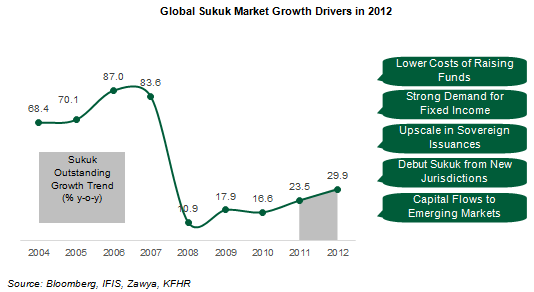
In 2012, a total of USD131.2bln worth of sukuk papers were recorded from the primary market, representing a y-o-y increase of 54.2%. The amount dwarfs that of previous years and even represents three times the size of the primary sukuk market pre the global financial crisis. Since 2008, total yearly issuances have grown at a compound annual growth rate of 67.4%.
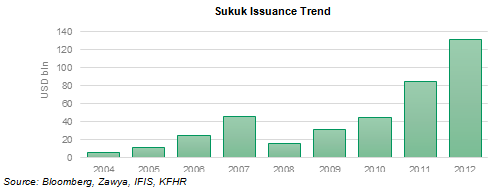
Sovereign issuers led the market share in 2012 despite a record amount of corporate sukuk placed during the year. Total issuances from sovereign entities throughout 2012 reached USD80.2bln as compared to USD58.9bln in 2011, representing a 36.0% y-o-y increase. Despite the dominant market share of 61.1%, sovereign papers were overshadowed by significant growth in both corporate and government-related entities which grew by 92.4% and 103.0% to USD36.5bln and USD14.5bln, respectively.
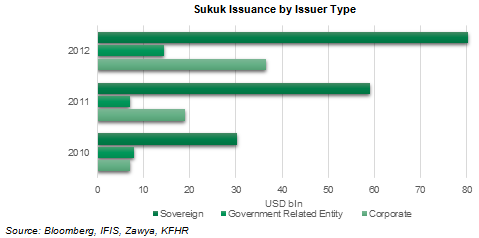
By region, issuances from Central and East Asia continued their growth momentum, climbing by 60.1% y-o-y to USD104.8bln during 2012. This was led by Indonesia (+131.1% y-o-y, USD6.0bln) and Malaysia (+59.4% y-o-y, USD97.1bln). Meanwhile, issuances from the Middle East and North Africa also increased by 34.4% y-o-y to USD26.3bln, mainly led by the 278.2% y-o-y jump in issuances from Saudi Arabia to USD10.5bln and the 49.3% y-o-y increase in issuances from the UAE to USD6.1bln.
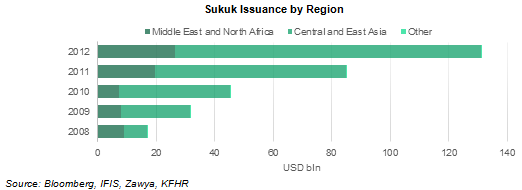
Within the corporate sukuk market, USD26.8bln worth of papers or 73.5% of total issuances were issued in Malaysia, while USD4.2bln (11.5%) was issued in the UAE and USD3.4bln (9.3%) was issued in Saudi Arabia. The largest corporate issuance for the year was the USD9.7bln worth 23-tranche sukuk Musharakah issued by Projek Lebuhraya Utara-Selatan (PLUS) Berhad, followed by the USD1.0bln worth perpetual sukuk Mudharabah issued by Abu Dhabi Islamic Bank (ADIB).
On the sovereign and quasi-sovereign side, Malaysia continued its leading market share in 2012 with USD70.3bln worth of sovereign and quasi-sovereign papers or 74.2% of the total market, mainly led by the central bank and numerous government-linked corporate entities such as Cagamas, Telekom Malaysia and Khazanah Nasional. This was followed by Saudi Arabia with USD7.1bln or 7.4% of the total and Indonesia with USD5.8bln or 6.2% of the total.
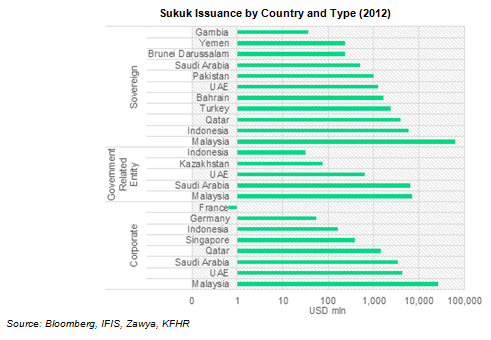
Global sukuk outstanding rose to USD231.4bln at the end-2012 from USD178.2bln at the end-2011 representing y-o-y growth of 29.9% (2011: 23.5%).
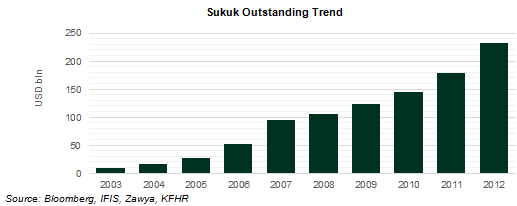
Sukuk yields continued their decline throughout 2012, in line with the trend in conventional bond yields, as fixed income instruments remain a preferred investor asset class amidst slower global economic growth. The HSBC/Nasdaq SKBI Yield Index showed a drop in sukuk yields from 3.991% at the end-2011 to 2.810% at the end-2012, the lowest since inception.
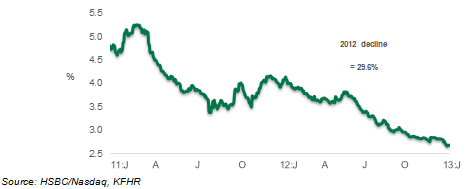
In terms of total return performance, the HSBC/Nasdaq SKBI Total Return Index, which tracks the return of an emerging sukuk portfolio consisting of 46 USD/GBP/JPY/EUR-denominated fixed/floating rate vanilla issuances, returned 9.69% during 2012, up from 7.13% in 2011.
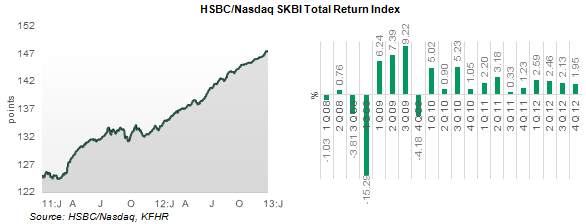
Based on the issuance momentum seen in 2012, the global sukuk issuance for 2013 is expected to illustrate strong but moderated growth of 20%-30%, supported by the following:
· Prospects for strong economic growth in 2013 remains doubtful given the tough challenges that still lie ahead. The IMF projects the world GDP growth of 3.6% in 2013, lower than earlier projections of 3.9%, which will keep investors focussed on safer fixed income assets. Furthermore, the high sovereign levels in Europe and the increasing US debt burden may well push investors away from conventional assets and into highly-rated sukuk papers.
· More sovereign issuers are anticipated to tap the sukuk market in 2013 as governments will continue to raise funds to support economic growth and fund fiscal deficits.
· New emerging market players as well as new non-Islamic issuers are expected to tap the sukuk market.
· Increasing demand and popularity for Shariah-compliant products and structures post the global financial crisis will form a strong demand base for sukuk.
· A number of new jurisdictions have shown interest in issuing sukuk, such as Egypt, Senegal, Libya, Tunisia and Nigeria and continue to make regulatory inroads for future issuances.
(Zawya / 16 Feb 2013)
---
Alfalah Consulting - Kuala Lumpur: www.alfalahconsulting.com
Islamic Investment Malaysia: www.islamic-invest-malaysia.com
No comments:
Post a Comment